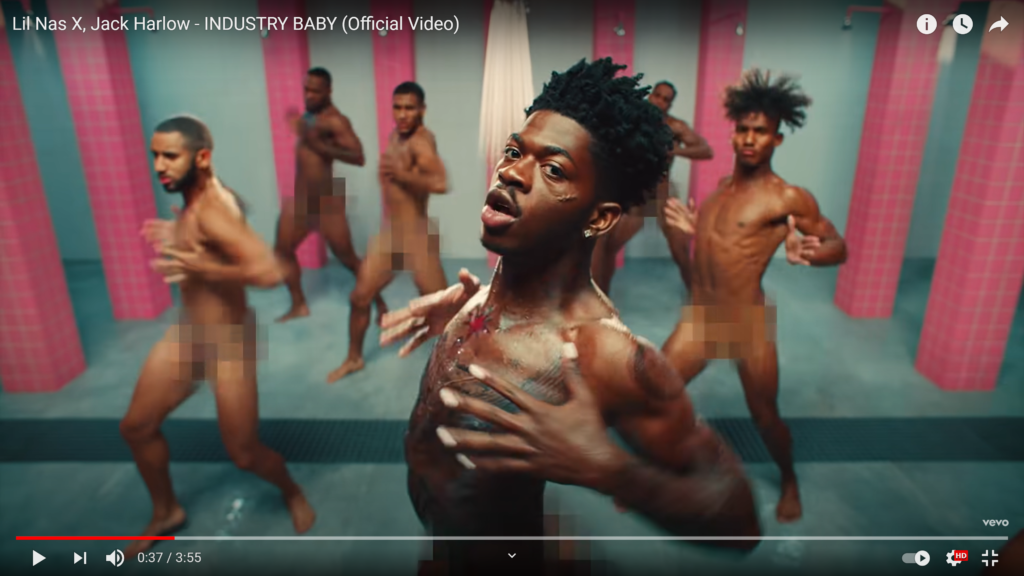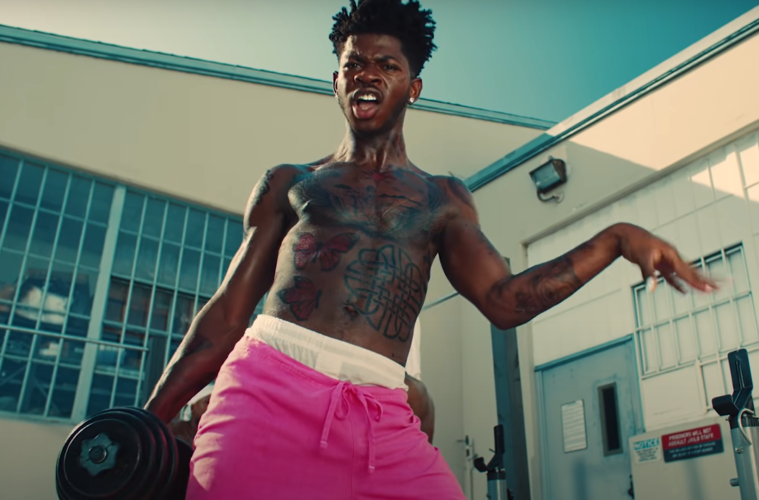Since Lil Nas X exists as both a queer man and a Black man simultaneously, it is important to recognize how the Industry Baby backlash is not only homophobic and racist but reflexive of a particular societal hatred for queer Black men.

Throughout Lil Nas X’s Industry Baby music video, he flips movie tropes present in Shawshank Redemption — such as having Jack Harlow deliver the rock hammer, or covering the hole in his cell wall with a poster featuring the iconic BET performance kiss — to centre queer Black narratives in a story originally focused on a white, cis-gendered, heterosexual man’s quest to escape prison. By the end of the video, Lil Nas X has freed himself and all the other queer Black inmates from Montero State Prison.
In the Industry Baby (Prelude), Lil Nas X illuminates how the “Satan shoe” lawsuit “…is about much more than shoes” and demonstrates — rather overtly — that Lil Nas X is being sent to jail because “even his mama knows” he’s gay.
I think it’s important to note that Lil Nas X is being sent to jail for being proud of his queerness. When the judge presses him to reveal his sexuality by bringing his mother into it, it implies that Lil Nas X’s queerness should sit “backseat” to his Black family, community, and perhaps even his Black identity.
Let’s take Candace Owens’ tweet for example. She thinks Lil Nas X is “…keeping Black America behind” for supposedly being too sexual as a result of his queer artistic expression.
Candace’s claim seems to be riddled with white supremacist notions of how black people should act “properly.” It adds to the frightening narrative that Black men shouldn’t express divergent world views — especially if those views are inherently queer — if they don’t want to be “left behind.” It reinforces the idea that all Black men have to do in their efforts of achieving equality is play into the patriarchy.
In George M. Johnson’s memoir manifesto delving into the intersectionality of his queer Black identity, he realized “…there is no such thing as a ‘respectable negro’ in the eyes of society, nor was I ever made to be one.”
In response to Industry Baby, Tariq Nasheed tweeted the following: “White corporate music execs funded a music video with Lil Nas X, where a bunch of Black men are in prison twerking. And the lone white man, Jack Harlow is sexually involved with a FEMALE guard. But all the Black men are sexually engaging with each other. This is progress?”
Traore Dynasty echoed Tariq’s homophobic sentiment to which Lil Nas X rebutted: “the truth is there is no attack. you view femininity as weakness. you don’t like gay black men because you are afraid of black men, as a whole, being viewed as weak. you cling on to your masculinity because without it you have nothing else going for yourself.”
It makes sense why Candace, Tariq, and Traore feel Black masculinity is under attack by Lil Nas X’s prideful queerness because of the historical emasculation of Black men in America through slavery, castration, and lynching.
As dictated by masculine scripts of gaining social power and worth, every man is sold the enticing patriarchal package that he can only “be a man” if he dominates others. For Black men, this toxic patriarchal prescription is intensified by racism — taught to be seen as a “real men” only by adopting the most extreme form of white hegemonic masculinity which is an arbiter for misogynistic and homophobic indoctrination.
Both Tariq and Traore are homophobic — they place an exorbitant emphasis on deriving privilege through heterosexuality, and furthermore, queerness comes to be seen by patriarchal Black men as too transgressive to yield equality.
bell hooks points out the solution for Black masculinity — and masculinity in general — may be realized when men learn to develop a sense of manhood free from misogyny and homophobia because true equality can never be achieved if we are forever reinforcing patriarchal conceptions of society through a lens of domination and subjugation.
I want to make it clear that as a white man, it is never my place to tell Black men how to act. However, as a queer theorist and a queer man, it is absolutely within my repertoire to be able to analyze and comment on patriarchal masculinity and how that intersects with, for example, gender, sexuality, and race.
In a book about menswear through history and into the future, Jay McCauley Bowstead explains how “…being seen as queer is a cost that has to be bourne in order to transgress the normative standards of the masculine dress…” Extrapolated, men — even beyond fashion — need to come to terms with the reality that there is no way to be free, happy, and worthy, that there is no way to revolutionize what it means to be a contemporary man in society without being queer!
In understanding and appreciating queer Black men like Lil Nas X, men may already have the necessary skills and perspectives to evolve their sense of manhood as one not rooted in the patriarchy, but rather one rooted inequality.
Published by HOLR Magazine


